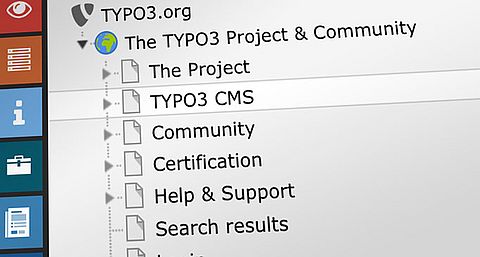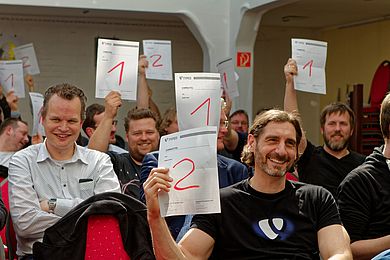How exactly did you start your engagement in those early years and what was the position of TYPO3 in the whole CMS market? How did the future look like at that time?
I was looking for a job in early 2002 and came across a job offer in a newspaper that just said „HTML, PHP, CMS? [PhoneNumber]“. I called them up and I think three days later I was part of the netfielders team – which was one of the few companies working with TYPO3 at that time. Jan-Hendrik, who is part of the TYPO3 Associations <link http: association.typo3.org expert-advisory-board>EAB (Expert Advisory Board), basically pushed me into the TYPO3 community, so on my first day at work I got to know René Fritz, Leander Seyfer and Karsten Rose just returning from the first snowboard tour. I had 2 hours per day for „Mailing List Duty“ as we called it, so I was responsible for helping out others in the community from very early on. For the first few months we were implementing cool stuff with TYPO3 3.2, later with 3.3.0 until Kasper signed off for a 6 week vacation. The result of that vacation were „Extensions“ - which kickstarted the whole success of the project as we have it now. Over time we were always involved in shaping the product and pushing it further into the market. Daniel Hinderink did an excellent job there while the eco-system grew. There was actually a time where you would enter „CMS“ on google and a click on „I'm feeling lucky“ brought you directly to <link http: typo3.org>typo3.org – incredible. Later I was invited to join the Active members of the TYPO3 Association – 12 people who tried to steer the projects direction – in order to work on the outside communication of the project. So less coding, more communication stuff for me.
What was the main reason for stepping back from activity at that time?
The Active members and I had different ideas how to work within the project back then. The T3A (TYPO3 Association) had been founded to primarily fund Kaspers development, so when Kasper stepped back, there was this sort of vacuum of what to do with the money. There were no control structures back then, meaning that everyone could just come up with a budget request and basically get the money. You did not have to deliver anything. Just take the money and walk away. I didn't like this, because by that time netfielders had been closed and I was running my own company wmdb Systems since then – so naturally I had a different view of how money should be given away. The tricky part with the old system was that budget applicants were among the ones that decided about the budgets. To me that was not a fair system. All that frustration led to a phase in my life where I simply had it with the official parts of TYPO3. I was constantly frustrated by how things were going and how in transparent the members budgets were assigned - so I made that more transparent. I must admit that this was not my brightest hours but at that time I simply had no other idea how to deal with that – in my perception it was just plain wrong and I felt it was up to the stakeholders to decide. During that time I guess I officially made to the top of the most hated people in the TYPO3 community. I guess that's due to my very direct and non-diplomatic way of dealing with things. I don't care about politics or promises, I care about results. I have to admit that a little more diplomacy and a little less punch-in-the-face attitude might have made my life and more importantly the life of other people in the community a lot easier. After some time the T3A installed the kind of control structures like we have now. Of course things could have gone faster but in the end I don't care that much about if it takes 3 months or 12 months to get it done – as long as you can see constant progress.If anything you are a great example of ‘scratching your own itch’ and probably scratching the itch of a lot of others along with that. Tell us what motivated you to get back on the horse.
Well, that one is actually pretty funny. See, I started a couple of shitstorms about the development of Flow and Neos because it took too long for my taste. In the back of my mind I saw all that money flowing into the project and no result I was able to grasp. When the first version came it was so dead slow that I was really angry. During carnival a huge German TYPO3 Hoster called Mittwald had a game going on that people should write a satiric verse (a german tradition during carnival) in order to win some prizes. While I can get cynical if you want me too I wrote all my frustration into a really really sarcastic verse (actually 12 verses). The result was that I won one of the main prizes – a ticket to the <link http: www.inspiring-conference.com about.html>Inspiring Flow and Neos conference. I'm not sure if the Mittwald guys did it on purpose but if so: well played, guys :) But if you lose, you gotta lose with style, so of course I had to go to the Inspiring Conference. I thought I would get nailed to the cross or at least no one would talk to me but funnily the Flow team had somehow addressed all the problems I had with Flow and slowly it started to look like something I could actually use. I also had rather long talks with Robert Lemke and Karsten Damblekans about the problems I saw and we came to a very simple conclusion: Typing words always goes wrong somewhere – you need to talk about things. In the end I remember Rens Admiraal talking to me for a couple of minutes and saying „You know what? You're not that asshole I thought you were.“ So I joined the Neos team not long after that because in the CMS team nobody was listening to me anymore anyways (and how could I blame them for that?). The real big thing happened in 2013 when I was invited to the<link http: typo3.org news article marketing-sprint-2013-strategy-workshop> Marketing sprint in Altleiningen. I arrived the night before and actually spent until 3am constantly arguing with Helmut Hummel from the CMS team at roughly 90 dB. I mean for real... we were shouting at each other for 4 hours straight. The next day was the first day of a <link news article marketing-sprint-2013-communication-workshop>Communication workshop by <link http: oss-watch.ac.uk>OSSwatch from the UK which was eye-opening to me. I took a deeper look at myself and then spent the next night talking to Helmut in a very meaningful manner – and now we go along incredibly well. During my talks with the CMS team I learned about the struggles they had going on with the team getting smaller, people being stuck customer projects and such. That's one of the problems with open source development – you need to rely on voluntary work. So being straight-forward and pragmatic I asked how much funding would be needed and voilá... <link http: www.workpackages.org>Workpackages.org was born. While I got back good on a personal level with the CMS team I realized that my work would be more valuable within this team.
You have a pretty explicit way of dealing with things. Obviously it moves things with engagement. How do you effectively manage that and do you see any downsides?
The CMS team is incredible. Everybody of them is full of passion to build a great tool for editors and developers as well. The management part is actually pretty simple... be available for everybody. That involves chat communication on Slack as well as Email, Telephone and being present at Sprints, Meetings, Usergroups etc.. To be honest, I'd like to attend every User Group meeting there is, but since I do all that on my private payroll I need to prioritize a bit. In general it's mostly about unblocking people – something the entire strategic team does, so that also applies to Oliver Hader, Ernesto Baschny, Christian Kühn, Benni Mack, Helmut Hummel, Xavier Perseguers and Anja Leichsenring.The main idea is to get to the heart of an issue quickly and to come up with helpful advice. It work's about 80% of the time :) Another thing you need to do is you need to effectively delegate tasks. There is so much talent within our team – we just need to feed the right stuff to the right people. If anyone asks for results, I give them the new Backend of TYPO3 CMS7 – which we received a lot of welcoming and motivating feedback for. But we're not done yet. The downside of working with passionate people is that they are fragile to things coming from the outside. So like when people argue in a in-your-face attitude over Twitter or something similar they get passionate about that as well. These things get problematic because those people from the outside don't get that their negative post result in people like me having to rebuild the motivation of an entire team. So most of the time people on Twitter are not really aware of the things their statements cause. I'd wish for a more humble tone in general, because after all: Those team members might build the product your entire business is based on – just be nice.
TYPO3 has developed into a project with several content management related products. Before your heavy involvement into TYPO3 CMS you have also participated in one or two Neos sprints. How do you feel about having two different content management systems? What is the basis for their existence?
I get that question all the time. It is very important to understand that I can only give a statement from my personal, business-wise point of view. Personally I can't sell Neos to my clients. Of course this is very client-specific. The clients we have mostly run huge, complex setups where Neos in its current state can't compete yet. One blocker for acceptance is the absence of an actual backend – most of wmdb's clients simply don't like that - they demand a backend editing interface - decoupled from the actual website. Apart from that I think that there will be a market for Neos eventually, but I doubt it will overlap significantly with the market of TYPO3 CMS. The editing interface is nice and clean and offers some neat possibilities. I think in the end you could think of it like the TYPO3 brand being a music label.One sub label sells Rock, the other sub label sells jazz.
And even though the rock guy can understand and appreciate what the jazz guy does, it's not his thing. But still both can co-exist within their respective markets.




